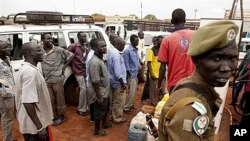Tens of thousands of people forced to flee violence along the border dividing Sudan from its southern neighbor are now confronted by difficulties of life in displacement camps.
Long after the 2005 peace agreement ended decades of civil war between Sudan and now-independent South Sudan, the United Nations is reporting fresh outbreaks of violence in the oil-producing Abyei region, the first official accounts of renewed fighting over the disputed area since Sudan raided it last May in a round of hostilities that displaced more than 110,000 people, including Mary Agwek Anget.
For Anget, who made her way to Wau, a town in western South Sudan, life in an encampment of more than 2,000 has not been easy.
"We have a problem of water, that is a serious problem here," she says. "The water we take is not clean here."
She also says there have been food shortages despite efforts by the World Food Program to feed camp residents. In her case, shortages are exacerbated by a case of typhoid she’s been fighting since she arrived.
Medical workers based inside the camp, who report frequent cases of malnutrition, malaria and pneumonia, expect illness to increase with the start of April's rainy season.
With spring rains come worries about structures within the camp itself; most families live in houses of dried grass and plastic tarps that won’t survive heavy storms, and they're pleading with international organizations to step in and provide more substantial housing.
But agencies already provide emergency shelter and even established a mobile health clinic to treat basic illnesses and assist pregnant women. The organizations also distribute food packages, though many in the camp say they're barely managing to get by.
No options
According to Salvatore Sortino of the International Organization for Migration (IOM), who ran Wau's office when the influx began, many refugee families quickly transitioned into better circumstances.
"Many of them, after some days, they found their relatives, connections," he says. "They managed to get some loans, and also they moved back to town. They either went to the place or stayed with relatives."
But more than 500 families remain, most of whom, he says, have no other options.
Deng Moyan Deng, who was elected chief of the Abyei camp earlier this year, is grateful to IOM and other organizations for their help, but wishes camp residents could work and support themselves.
"It looks like we depend on the NGOs who are supporting us here in the camp," he says. "For you to be a human being depending on some other system, one day it will make you lazy -- you will not work hard to feed yourself and your family. But we don’t have any choice."
With few jobs to be had and no land to cultivate, Deng says some women have turned to prostitution to make extra money for their families, while others sell any extra food they get from the aid organizations.
After almost a year in the camp, Deng and the other residents are eager to return home, but reports of recent bombings in Abyei indicate the underlying issues that led to their displacement aren't nearing resolution.
Deng plans to stay in the camp until Sudan and South Sudan are able to guarantee peace in Abyei, but he knows he could be waiting for a while.




